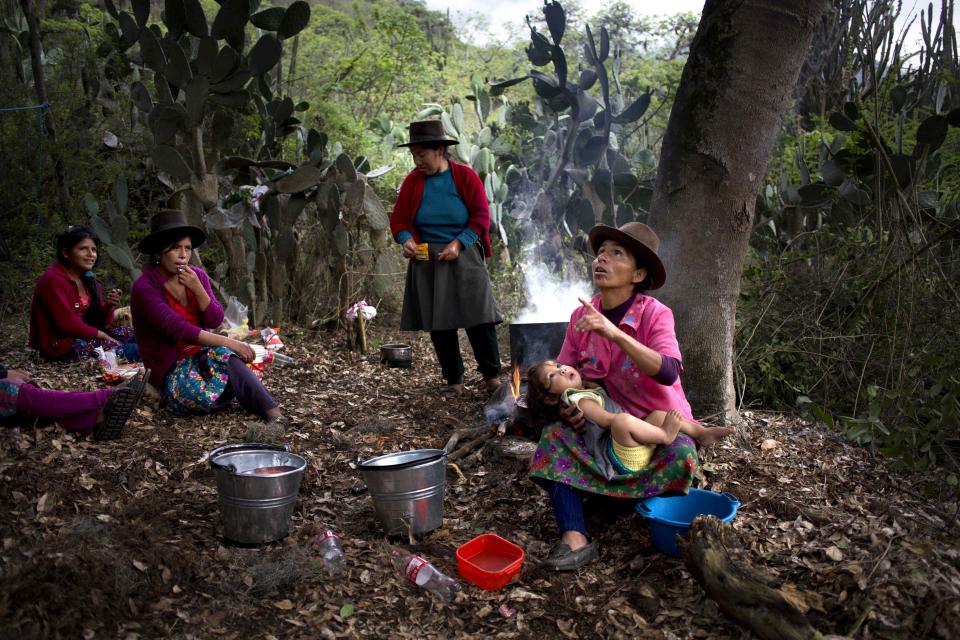
Valentin Casa can’t shake the recurring nightmares. And this day certainly isn’t helping.
The 36-year-old farmer looks on as forensic investigators unearth a pair of finger bones and two copper rings from a mass grave in the village of Huallhua on the eastern steppes of Peru’s Andes.
The grave contains the long-buried remains of two women and 13 children, and Casa believes the bones and rings belonged to his mother.
As a boy 27 years ago, Casa watched from behind trees as soldiers and their paramilitary allies dismembered and killed his mother and other women and children left behind by fleeing Shining Path rebels.
Civilians suspected of backing the rebels were hunted down and killed. Two weeks later, troops and their civilian confederates caught and killed men from Casa’s village, including his father, whose throat they slit.
Three decades later, this isolated corner of Peru is witnessing the biggest exhumation to date of victims of the nation’s 1980-2000 internal conflict. The worst of its carnage occurred on these hills between the Andes ridge and Amazon jungle.
“Everybody here is traumatised,” Casa says as he watches the work underway. “Whoever says he isn’t is lying.”
Authorities in Lima have been painfully slow to dispatch teams to dig up the dead from a conflict that, according to a 2003 truth commission report, claimed an estimated 70,000 lives. Just over half were slain by Maoist-inspired rebels, over a third by security forces. Fifty criminal investigations were only launched into the killings in 2011, said the prosecutor in charge, Gloria Pareja.
In November, forensic anthropologists began their work in the Chungui district and expect to remove 202 bodies in all — mostly women and children.
At least 1,384 people were killed in Chungui, which is slightly larger than Hong Kong geographically but has only 6,000 inhabitants. People there are constantly uncovering bones but very few graves have been exhumed by professionals.
The killing fields are an 18-hour walk from the nearest road in a region known as Oreja de Perro, or Dog’s Ear. It is a place where health care, schools, police and other institutions barely exist. There are no roads, electricity or phones. The hills are still patrolled by Shining Path rebels, and drug traffickers flaunt the state’s absence.
Casa provides security for the forensic team while armed with a worn Mossberg 500 shotgun. The exhumers gather the diminutive bones of children, 26 found so far in the district, in boxes made to hold sweet bread. “I drank my own urine to survive,” Casa remembers, after his mother was killed and he fled into the forest.
Teresa Vilchez, 52, says she still suffers occasional vaginal bleeding from a gangrape by soldiers in 1984 at the nearby Mollebamba barracks. Rebels killed her husband, she says, and soldiers killed her mother, who she says was disfigured in the customary way after being raped: Her breasts were cut off.
No one has been arrested or prosecuted to date for the crimes in Chungui — not a single soldier, rebel or civilian. Villagers say no one has received any mental health counselling. Vilchez has never seen a gynaecologist.
It was exactly such conditions that prompted the poor farmers of Chungui to initially welcome the Shining Path. In 1965, other Cuban-inspired guerrillas had freed farmers there from grinding servitude, assassinating the two powerful ranchers responsible.
The Shining Path persuaded farmers to abandon their homes and live in forest camps to avoid encounters with soldiers. But the rebels were merciless, said Edilberto Jimenez, an anthropologist who interviewed survivors in the 1990s.
Wary of being discovered, the rebels prohibited people from lighting cooking fires, forced women to give birth in caves and killed children who did not keep quiet when soldiers neared, Jimenez said. Today’s Shining Path only numbers in the hundreds, taxes the cocaine trade and still has a reputation for cultivating local farmers.
Priska Palacios, a worker from the German government development agency GIZ, said little has changed for poor farmers in Chungui. “The basic conditions that generated the conflict — poverty, exclusion, discrimination — are exactly the same as they were in 1980,’’ Palacios said.
Wednesday 11 December 2013
http://www.financialexpress.com/news/reclaiming-the-dead/1205599/2

0 comments:
Post a Comment